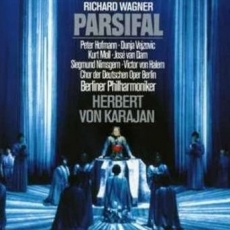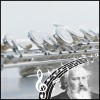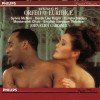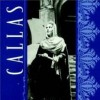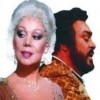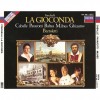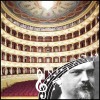Libretto
Parsifal is an opera in three acts by Richard Wagner. It is loosely based on Wolfram von Eschenbach's Parzival, the 13th century epic poem of the Arthurian knight Parzival (Percival) and his quest for the Holy Grail.
During the first act, Parsifal, an apparently witless fool, sees the suffering of the wounded Amfortas, King of an order of knights who guard the Grail. In the second Act Parsifal wanders into the domain of Klingsor, a magician who is trying to corrupt the Knights of the Grail and who has stolen from them the Holy Spear used to pierce Jesus Christ during his crucifixion. There Parsifal meets Kundry, the slave of Klingsor, who attempts to seduce him. In resisting her, he destroys Klingsor, and recovers the Spear. In the third Act, Parsifal returns to the Grail Kingdom to heal Amfortas.
Wagner first conceived the work in April 1857 but it was not finished until twenty-five years later. It was to be Wagner's last completed opera and in composing it he took advantage of the particular sonority of his Bayreuth Festspielhaus. Parsifal was first produced at the second Bayreuth Festival in 1882. The Bayreuth Festival maintained an exclusive monopoly on Parsifal productions until 1903, when the opera was performed at the Metropolitan Opera in New York.
Wagner preferred to describe Parsifal not as an opera, but as "ein Bühnenweihfestspiel" - "A Festival Play for the Consecration of the Stage". At Bayreuth a tradition has arisen that there is no applause after the first act of the opera.
Wagner's spelling of Parsifal instead of the Parzival he had used up to 1877 is informed by an erroneous etymology of the name Percival deriving it from a supposedly Arabic origin, Fal Parsi meaning "pure fool".
Synopsis
Place: the mountains to the north of Spain, the castle of Monsalvat and Klingsor's magic palace.
Act 1
Scene 1
Ethereal music—in a major chord—is heard, finishing on an octave note. The sequence is reprised in a minor chord and ends without the high note. Next, the Grail leitmotif is followed by a brassy 'Faith' leitmotif. The prelude closes with wandering strains that finally resolve as the Holy Forest is reached.
In a forest near the castle of Monsalvat, home of the Grail and its Knights, Gurnemanz, eldest Knight of the Grail, wakes his young squires and leads them in prayer. He sees Amfortas, King of the Grail Knights, and his entourage approaching. Amfortas has been injured by his own holy spear, and the wound will not heal.
Gurnemanz asks its lead knight for news of the king’s health. The knight says the king has suffered during the night and is going early for a bath in the holy lake. The squires ask Gurnemanz to explain how the king’s injury can be healed, but he evades their question and a wild woman—Kundry—bursts in. Kundry is sort of an etherial spirit or jinn, she can fly and deliver messages and find valuable things for the knights, but she suffers from a mysterious malady. She gives Gurnemanz a vial of balsam, brought from Arabia, to ease the King’s pain and then collapses, exhausted.
Parsifal by Hermann HendrichAmfortas arrives, borne on a stretcher by Knights of the Grail. He calls out for Gawain, whose attempt at relieving the king's pain had failed. He is told that this knight has left again, seeking a better remedy. Raising himself somewhat, the king says going off without leave ("Ohn' Urlaub?") is the sort of impulsiveness which led he himself into Klingsor’s realm, and to his downfall. He accepts the potion from Gurnemanz and tries to thank Kundry, but she answers hastily that thanks will not help and urges him onward, to his bath.
The procession leaves. The squires eye Kundry with mistrust and question her. After a brief retort, she falls silent. Gurnemanz tells them Kundry has often helped the Grail Knights but that she comes and goes unpredictably. When he asks directly why she does not stay to help, she answers, "I never help!" ("Ich helfe nie!"). The squires think she is a witch and sneer that if she does so much, why not find the Holy Spear for them? Gurnemanz solemnly tells that this deed is destined for someone else. He says Amfortas had just been given guardianship of the Spear, but lost it as he was being seduced by an irresistibly attractive woman in Klingsor’s domain. Klingsor grabbed the Spear and stabbed Amfortas: this wound causes Amfortas both suffering and shame, and as Gurnemanz says, it will never heal on its own.
Squires returning from the king’s bath tell Gurnemanz that the balsam has eased the King’s suffering. Gurnemanz's own squires ask how it is that he knew Klingsor. He solemnly tells them how both the Holy Spear, which pierced the side of the Redeemer on the Cross, and the Holy Grail, which caught the flowing blood, had come to Monsalvat to be guarded by the Knights of the Grail under the rule of Titurel––Amfortas’ father. Klingsor had yearned to join the knights but, unable to keep impure thoughts from his mind, resorted to self-castration, causing him to be expelled from the order. Made bitter, Klingsor set himself up in opposition to the realm of the Grail, learning dark arts, claiming the valley domain below and filling it with beautiful flower-maidens to seduce and enthrall wayward Grail Knights. It was here that Amfortas lost the Holy Spear, kept by Klingsor as he schemes to get the Grail, too. Gurnemanz tells how Amfortas later had a holy vision which told him to wait for a “pure fool, enlightened by compassion” (“Durch Mitleid wissend, der reine Tor”) who would finally heal the wound.
At just this moment, cries are heard from the Knights: a flying swan has been shot, and a young man is brought forth, a bow in his hand and a quiver of matching arrows. Gurnemanz speaks sternly to the lad saying this is a holy place. He asks him outright if he did this deed, and the lad boasts that if it flies, he can hit it ("Im Fluge treff' ich was fliegt!") The elder knight asks what harm the swan had done, showing the youth its blood-flecked body, limp wings and lifeless eyes. Now remorseful, the young man breaks his bow, casting it and the arrows aside. Gurnemanz asks him why he is here, who is his father, how he found this place and, lastly, his name. To each question the lad replies, "I don't know." The elder Knight sends his squires away to help the king and now asks the young man to tell what he does know. The young man says he has a mother, Herzeleide, and that he made the bow himself. Kundry has been listening and now she tells them that this boy’s father was Gamuret, a knight killed in battle, and also how the lad’s mother had forbidden her son to use a sword, fearing that he would meet the same fate as his father. Now the youth recalls that upon seeing knights pass through his forest, he left his home and mother to follow them. Kundry laughs and tells the young man that, as she rode by, she saw Herzeleide die of grief. Hearing this, the lad first jumps at Kundry but then collapses in grief. Kundry herself is now weary for sleep, but cries out that she must not sleep and wishes that she would never again waken. She disappears into the undergrowth.
Gurnemanz knows that the Grail leads only the pious to Monsalvat and thus takes the lad to observe the Grail ritual. The youth does not know what the Grail is, but he remarks that as they walk, he seems scarcely to move, seems to travel far. Gurnemanz says that in this realm, time becomes space. An orchestral interlude leads into Scene Two.
Scene 2
They arrive at the Hall of the Grail, where the Knights are assembling to receive Holy Communion. The voice of Titurel is heard, telling his son, Amfortas, to uncover the Grail. Amfortas is racked with shame and suffering (" Wehvolles Erbe, dem ich verfallen"). He is the guardian of these holy relics yet has succumbed to temptation and lost the Spear: he declares himself unworthy of his office. He cries out for forgiveness (“Erbarmen!”) but hears only the promise of future redemption by the pure fool. On hearing Amfortas' cry, the lad appears to suffer with him, clutching at his heart. The knights and Titurel urge Amfortas to reveal the Grail, which he finally does. The dark Hall is now bathed in the light of the Grail as the Knights commune. Gurnemanz motions to the youth to participate, but he seems entranced and does not heed. Amfortas does not commune and, as the ceremony ends, collapses in pain and is carried away. Slowly the Hall empties leaving only the young man and Gurnemanz, who asks him if he has understood what he has seen. When the lad cannot answer, he is sent out by a side door, warned by Gurnemanz to hunt geese, if he must, but to leave the swans alone. A voice from high above repeats the promise, “The pure fool, enlightened by compassion."
Act 2
Prelude — Frenetic, descending musical figures tumble downward, coming to rest in lethargic and nebulous solitude.
Scene 1
The second act opens at Klingsor’s magic castle. Klingsor reveals the source of Kundry's malady: she is under his magical control and when she helps the Knights she's really spying for him. He conjures her, waking her from her trance. He calls her by many names: First Sorceress, Hell's Rose, Herodias, Gundryggia and, lastly, Kundry. She is now transformed into an incredibly alluring woman, as when she seduced Amfortas. She mocks Klingsor's unholy sexlessness but she cannot resist his power. Klingsor observes that Parsifal is approaching, and summons his enchanted knights to fight him. He observes that Parsifal kills all who oppose him, but Klingsor doesn't mind; the knights are his despised slaves and he'd like to see them all killed.
Klingsor sees this young man stray into his Flower-maiden garden and calls to Kundry to seek the boy out and seduce him. Once Parsifal becomes impure, Klingsor will be able to enchant him or kill him with the spear he has stolen from Amfortas.
The triumphant youth finds himself in a wonderous garden, surrounded by beautiful and seductive Flower-maidens. They call to him and entwine themselves about him while also chiding him for wounding their lovers... and for resisting their charms ("Komm, komm, holder Knabe!"). They soon fight and bicker amongst themselves to win his singular devotion, to the point that he is about flee, but a voice calls out, "Parsifal!" He now recalls this name is what his mother used when appearing in his dreams. The Flower-maidens back away from him and call him a fool as they leave Parsifal and Kundry alone. He wonders if they were only a dream and asks how it is she knows his name. Kundry tells him she learned it from his mother ("Ich sah das Kind an seiner Mutter Brust."), who had loved him and tried to shield him from his father’s fate; the mother he had abandoned and who had finally died of grief. She reveals many parts of Parsifal's history to him and he is stricken with remorse, blaming himself for his mother’s death. He thinks himself very stupid to have forgotten her. Kundry says this realization is a first sign of understanding and that, with a kiss, she can help him understand his mother’s love. A lengthy kiss follows as music evokes the Fool's recollection of previous experiences. Parsifal suddenly recoils in pain and cries out Amfortas' name: he feels the wounded king's pain burning in his own side, and now understands Amfortas’ passion during the Grail Ceremony ("Amfortas! Die Wunde! Die Wunde!") Filled with this compassion, Parsifal rejects Kundry.
Furious that her ploy has failed, Kundry tells Parsifal that if he can feel compassion for Amfortas, then he can feel compassion for her as well. She has been cursed for centuries, unable to rest, because she saw the Savior on the cross and laughed. Now she can never weep, only laugh, and she is enslaved to Klingsor as well. He rejects her yet again but then asks her to lead him to Amfortas. She begs him to stay with her for just one hour, and then she will lead him to Amfortas. When he still refuses, she curses him to wander without ever finding the Kingdom of the Grail, and finally she calls on her master to help her.
Klingsor appears and throws the Spear at Parsifal but it stops in midair, above his head. Parsifal takes it and makes the sign of the Cross. The castle crumbles and as he leaves the scene, he tells Kundry that she knows where she can find him again.
Act 3
Scene 1
The Third act opens as it did in the First, in the domain of the Grail, but many years later. Gurnemanz is now aged and bent. He hears moaning near his hermit's hut and discovers Kundry unconscious in the brush, as he had many years before ("Sie! Wieder da!"). He revives her using water from the Holy Spring, but she will only speak the word “serve” (“Dienen”). Gurnemanz wonders if there is any significance to her reappearance on this special day. Looking into the forest, he sees a figure approaching, armed and girt in full armour. The stranger wears a helmet and the hermit cannot see who it is. Gurnemanz queries him, but gets no response. Finally, the apparition removes its helmet and Gurnemanz recognizes the lad who shot the swan, and then joyfully recognizes that the Holy Spear is now returned.
Parsifal tells of his desire to return to Amfortas ("Zu ihm, des tiefe Klagen.") He relates his long journey hence, wandering for years, unable to find a path back to the Grail: he had often been forced to fight, but never wielded the Spear in battle. Gurnemanz tells him that the curse preventing Parsifal from finding his right path has now been lifted, but that in his absence Amfortas has never revealed the Grail, and that Titurel has died. Parsifal is overcome with remorse, blaming himself for this state of affairs. Gurnemanz tells him that today is the day of Titurel’s funeral rites, and that Parsifal has a great duty to perform. Kundry washes Parsifal’s feet and Gurnemanz anoints him with water from the Holy Spring, recognizing him as the pure fool, now enlightened by compassion, and as the new King of the Knights of the Grail.
Parsifal looks about and comments on the beauty of the meadow. Gurnemanz explains that today is Good Friday, when all the world is renewed. Parsifal now baptizes the weeping Kundry. Tolling bells are heard afar off; Gurnemanz says Midday: the hour has come. My lord, permit your servant to guide you! and all three set off for the castle of the Grail. A dark orchestral interlude (Mittag) leads into the solemn gathering of the knights in Scene Two.
Scene 2
Within the castle of the Grail, Amfortas is brought before the Grail shrine itself, and Titurel’s coffin. He cries out to his dead father to offer him rest from his sufferings, and wishes to join him in death ("Mein vater! Hochgesegneter der Helden!") The Knights of Grail passionately urge Amfortas to uncover the Grail to them again but Amfortas, in a frenzy, says he will never again show the Grail, commanding the Knights, instead, to slay him thus ending his suffering and the shame he has brought on the Knighthood. At this moment, Parsifal steps forth and says that only one weapon can heal the wound ("Nur eine Waffe taugt"): with the Spear he touches Amfortas’ side, and both heals and absolves him. He commands the revealing of the Grail. As all present kneel, Kundry, released from her curse, sinks lifeless to the ground as a white dove descends to hover over the head of Parsifal.





